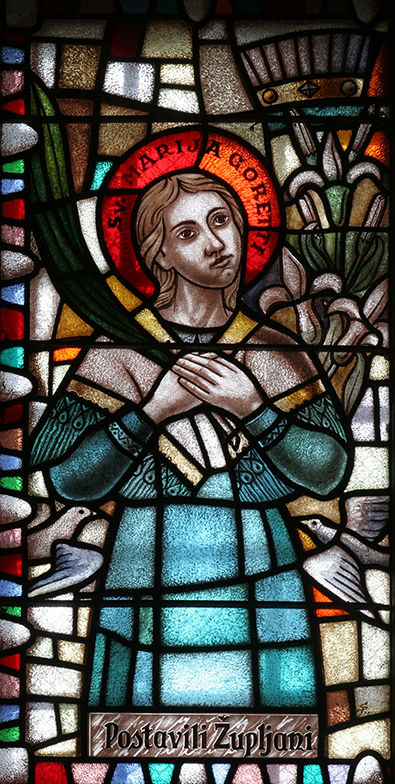The relics of St. Maria Goretti were within walking distance of my house during their U.S. tour. Without thinking much about her, her life, or her death, I went to venerate them.
As I walked into the church, her story turned over in my mind: she was sexually assaulted as a young teenager. She fought her attacker as best she could. While she was dying of the wounds he caused her, she forgave her attacker.
She forgave her attacker. Her murderer. Her would-be rapist.
This realization struck me, I who am so capable — and, often, all too willing — to hold on to petty grievances.
How often do I hold on to my anger and my idea of justice over a small slight? How often am I too prideful to forgive, clinging to my hurt, even at times when the offense was unintentional? Yet this 14-year-old girl was able to forgive someone whose offense was intentional — and brutal.
Maria Goretti’s example inspires me to cultivate a merciful heart and extend mercy to those around me — particularly appropriate during this Year of Mercy. An article by Father Carlos Martins, CC, on the website for the relics’ tour emphasizes the centrality of forgiveness to Christianity.
He writes, “As Maria understood so well, forgiveness is something quintessentially Christian. Indeed, it was to share with us the Father’s forgiveness that Christ became incarnate and underwent His torture and death.”
In other words, the more I am able to forgive others, the more I share Christ’s love with them and understand God’s love for me — but how? I have often wanted to forgive those who have caused me pain, only to bubble in anger at the thought of the offense.
Father Martins says that forgiveness is a choice, an act of the will, that can begin regardless of our emotions. Rather than being an absence of anger or hurt, as I have often thought, forgiveness means asking Jesus to enter into the situation and bless the offender.
When our negative feelings reappear, as they will do if it is a major offense, our prayer can arise out of these feelings.
This process of forgiveness can only be done after we acknowledge the violation, writes Martins, rather than minimizing the transgression by pretending it’s “OK.” Many offenses, such as the death of a child or injury to oneself, can never be “OK” or repaired, but forgiveness is still possible in these situations, as St. Maria Goretti, in her meekness, shows us.
In the process of forgiving, Father Martins proposes that the victim pray this prayer aloud, “Jesus, I release [offender’s name] from his debt to me and I give that debt to you. In place of that debt I ask You to give [offender’s name] a blessing instead.”
Like all prayer, it must be prayed with humility: we must acknowledge our own sinfulness and our inadequacy in forgiving the offender. After this prayer, Father Martins recommends communicating forgiveness to the offender, if it is possible and will not subject the victim to more abuse.
This process of forgiveness may, at times, leave us feeling “at peace” about the situation, while other times sadness, anger and hurt will still be present. True forgiveness leaves us free from these emotions by turning them into a prayer.
Anamaria Scaperlanda Biddick writes from Oklahoma City.

